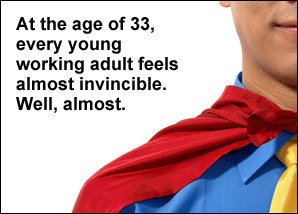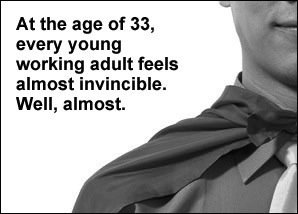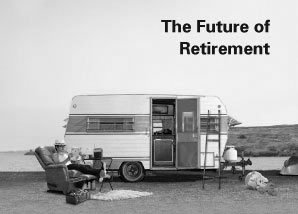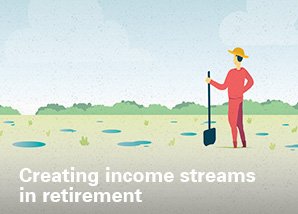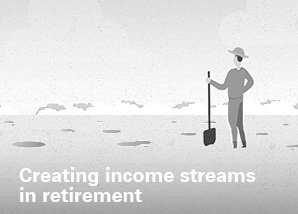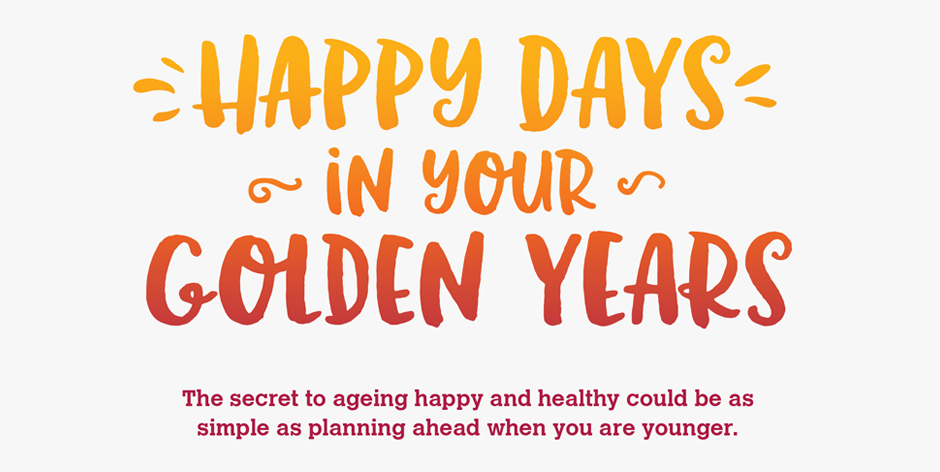
|
Throughout most of our adult lives, we work hard to provide financially for our families and to build a comfortable nest egg for our retirement. Yet sometimes when we reach our golden years, we may not be able to fully enjoy the fruits of our labour because of declining health, a disability or financial constraints. Fortunately, we always have time to make changes in our lives to prepare for a happy and healthy ageing no matter what life stage we are at currently. Preparation is key to our well being as we grow older; the younger we start the better odds we have of enjoying healthy, happy and financially sound golden years.1 |
Research shows the earlier we commit ourselves to a healthy lifestyle, the better our chances are of ageing well.2 By being more physically active and connected to others, we can also feel better regardless of age even if we have some health issues.2 Here are some tips for you to consider to maintain your physical and emotional health, and live life to the fullest as you plan ahead for your golden years. |

Managing Your Physical Health |
|
Develop a physically active lifestyle early.A recent Swedish study found that exercise is the number one contributor to longevity, adding extra years to your life as well as life to your years.3 Exercise helps you maintain your strength and agility, increases vitality, improves sleep, gives your mental health a boost, and can even help diminish chronic pain.3
Learn to eat well.As we age, our body’s relationship with food may change along the way.3 A decreased metabolism, changes in taste and smell, and slower digestion may affect our appetite, the foods we can eat, and how our body processes food.3 The key is to figure out how to adapt to your changing needs.3 As you grow older, healthy eating is important to maintain your energy and health. This includes loading up on high fibre fruits, vegetables and whole grains, and ensuring that your body is well dehydrated to keep your energy levels up and stay sharp.3 |
Get adequate sleep.Many adults complain of sleep problems as they age, including insomnia, daytime sleepiness and frequent waking during the night. But getting older doesn’t automatically bring sleep problems.3 Poor sleep habits developed at a younger age are often the main causes of low-quality sleep as you grow older.3 By practicing good sleep habits like naturally boosting your melatonin levels at night by turning off the TV or computer at least an hour before bed time, developing bed time rituals like playing music to help you wind down, or even increasing your activity levels during the day can help promote good sleep as you age.3 |

Dispelling the Myths About Healthy Ageing |
|
You are unable to learn new thingsFact: One of the more damaging myths of ageing is that after a certain age, you just won’t be able to try anything new or contribute things anymore. The opposite is true. Middle aged and older adults are just as capable of learning new things and thriving in new environments, plus they have the wisdom that comes with life experience. If you believe in and have confidence in yourself, you are setting up a positive environment for change no matter what your age. |
Genes determine your future destinyFact: While some destiny may be determined by the genes we inherit from our parents, there’s a lot we can do to avoid the destiny that was predisposed to us. Studies have found that genes are a factor in extreme longevity only 20% of the time. Instead, being physically healthy is more likely to contribute to a lower resting metabolic rate, which means that your body is still working efficiently as you grow older. |
Memory loss is an inevitable part of ageingFact: As you age, you may eventually notice you don’t remember things as easily as in the past, or memories may start to take a little longer to retrieve. However, significant memory loss is not an inevitable result of ageing. Brain training and new learning can occur at any age and there are many things you can do to keep your memory sharp. The sooner you start, the sooner you’ll reap the benefits. |
Ageing means declining health and/or disabilityFact: There are some diseases that become more common as we age. However, getting older does not automatically mean poor health or that you will be confined to a walker or wheelchair. Plenty of older adults enjoy vigorous health, often better than many younger people. Preventive measures like healthy eating, exercising and managing stress can help reduce the risk of chronic disease or injuries later in life. |
|
Source: Helpguide.org, Aging Well: Tips for Staying Healthy and Happy as You Age, October 2017 & NPR.org, Secrets of the Very Old and Healthy – Start When You’re Young, April 2016. |
|
Managing Your Emotional Health |
|
Find meaning and joy in life.Many of us go through life too focused on providing for our families and our loved ones that we sometimes forget about ourselves. A key ingredient to healthy ageing is the continuing ability to find meaning and joy in life.3 While everyone may have different ways of experiencing meaning and joy, finding activities that you enjoy outside of work and your immediate family to nourish your spirit is important.3 Whether it’s picking up a new hobby, volunteering in your local community, travelling to new places or perhaps learning a new musical instrument, finding activities that are both meaningful and enjoyable will contribute to ageing happy – more so if your career is slowing towards retirement or your children are leaving home.3 |
Stay connected.One of the greatest challenges of ageing is how our support network changes.3 Staying connected isn’t always easy as our life circumstances change – from career changes to retirement, to close friends and family members moving away.3 Yet it is important to find ways to reach out and connect with others, because along with regular exercise, staying social can have the most impact on your health as you age.3 Having people you can turn to for company and support as you age is a buffer against loneliness, depression, disability, hardship and loss.3 |
Keep your mind sharp.Keeping our brains active and maintaining creativity can actually help to prevent cognitive decline and memory problems.3 The more active and social we are, and the more we use and sharpen our brains, the more benefits we will gain.3 This is especially true if your career no longer challenges you or if you’ve retired.3 To keep your brain ticking, you could do things that challenge your brain like puzzles or games, or you could learn a new subject like a different language or a new skill.3 |
|

Coping with Life Changes Through Life StagesAs we go through different stages in life, a constant challenge is coping with change.3 Through continually reinventing yourself in your 30s, 40s, 50s and beyond by learning to adapt to change, finding new things you enjoy, staying physically and socially active, as well as feeling connected to your loved ones and community, you will be able to cope better with change and stay healthy and happy as you age.3 |
|
Focus on the things you’re grateful for.The longer you live, the more you lose. But as you lose people and things, life becomes even more precious.3 When you stop taking things for granted, you appreciate and enjoy what you have even more.3 |
|
Accept the things you can’t change.Many things in life are beyond our control.3 Rather than stressing out over them, focus on the things you can control such as the way you choose to react to problems.3 Face your limitations with dignity and a healthy dose of humour.3 |
|
Look for the silver lining.As the saying goes, “What doesn’t kill us makes us stronger.”3 When facing major challenges, try to look at them as opportunities for personal growth.3 If your own poor choices contributed to a stressful situation, reflect on them and learn from your mistakes.3 |
|
Take daily action to deal with life’s challenges.When a challenge seems too big to handle, sweeping it under the carpet often appears the easiest option.3 But ignoring the problem doesn’t make it go away; it allows both the problem and your anxiety to build.3 Instead, take things one small step at a time.3 Even a small step can go a long way to boosting your confidence and reminding you that you are not powerless.3 |
|
Managing Your Financial Health |
|
Plan early for your golden years.The rule of thumb is that you will need 70% of your annual pre-retirement income to live comfortably in your golden years.4 As such, you should start your retirement planning early to meet your financial goals later in life – whether this is through savings, investments, or perhaps working part-time in retirement. And as your career or personal circumstances change, you should review and update your financial plans for retirement regularly.1
Prepare for the unexpected.Emergencies and disasters can happen at any time, so it is important to have a protection plan in place that takes care of your family’s financial well-being if something unexpected occurs. Review your insurance plans periodically to ensure that the coverage is adequate for your needs.1 |
Ensure your legacy continues.We work hard during our life time to build our wealth for our family and the next generation. As we think ahead to the golden years, it is important for us to consider how we can secure our legacy so our loved ones are provided for into the future. Part of legacy planning includes ensuring that your wealth is distributed according to your wishes and that there is hassle-free distribution of your legacy to your next generation. A protection plan like HSBC’s UniversalLegacy not only helps in preserving your wealth, but also in transferring it in an efficient way to the people and causes that matter most to you. To learn more about how we can help you plan ahead for a successful retirement now, speak to your Relationship Manager today or walk into any HSBC branch. |

• Source: 1 American Psychological Association, Life Plan for the Life Span, 2012. 2 Victoria State Government Health & Human Services, Well for Life: A Healthy Approach to Ageing, November 2015. 3 Helpguide.org, Aging Well: Tips for Staying Healthy and Happy as You Age, October 2017. 4 CNN Money, Ultimate Guide to Retirement, undated. |
|


















